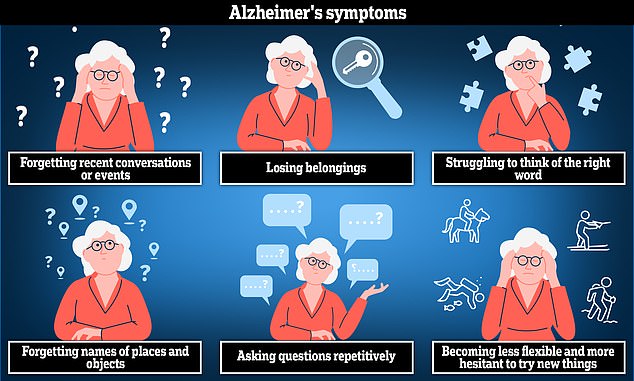Top dementia expert reveals the two popular diets that could actually stop Alzheimer’s before it strikes, according to science
Berries boost your cognitive function. Fish oil supplements can improve your memory. Curry cures Alzheimer’s.
You may have come across these rumors about the “magical” effects of certain foods on the internet and in social media.
But if you rely on any of these statements in your daily life, you could be wasting time and money.
It is now thought that around 944,000 people in the UK are living with dementia, while in the US the figure is estimated to be around 7 million. Alzheimer’s disease affects around six in ten people with dementia.
But can specific foods or diets really prevent or avoid the condition?
Research has suggested that two diets in particular, the Mediterranean diet and MIND, may offer some protection against cognitive decline. They encourage consuming whole foods, plants and seeds, and avoiding or limiting alcohol
As a specialist nurse and researcher who has been working with people with dementia for decades, I often get this question.
The answer is that there is no specific anti-Alzheimer’s diet, but what is good for your heart is also good for your head.

Professor June Andrews OBE FRCN FCGI is an expert in the care of older, frail and dementia patients
That’s because research shows that people with certain conditions, such as heart disease, high blood pressure, obesity and diabetes (which affect at least 2 million Britons), are more likely to experience age-related cognitive decline than people without these conditions.
There is ample evidence that changing your diet reduces your risk of developing these diseases.
Research has shown that two diets in particular, the Mediterranean diet and the MIND diet (similar to the Mediterranean diet but with fewer animal products), may offer some protection against cognitive decline.
They encourage consumption unprocessed foods, plants and seeds, and avoiding or limiting them alcohol.
Below I describe some specific foods that you should have on hand if you want to increase your chances of fighting dementia.
Make sure you have enough kale, spinach and broccoli
It’s really hard to say that one thing or food group is more important than another, it’s all about balance.
But fruits and vegetables are very important because of the antioxidants and vitamin C they contain.

Alzheimer’s disease is the most common cause of dementia. The disease can cause anxiety, confusion and loss of short-term memory.
A US study last year found that people who followed the MIND diet, which mainly ate green leafy vegetables such as spinach and kale, had lower levels of proteins in their brains that are linked to Alzheimer’s.
Published in the magazine Neurologythey found that those who ate seven or more servings per week had levels of harmful brain plaque equivalent to an age difference of nearly 19 years compared to those who ate the least.
Puja Agarwal, study author and assistant professor specializing in the role of nutrition in neurodegenerative diseases at Rush University in Chicago, said at the time: “These results are exciting.
“Our finding that eating more green leafy vegetables itself is associated with fewer signs of Alzheimer’s disease in the brain is intriguing enough to make people consider adding more of these vegetables to their diet.”
Learn to love lentils
Whole grains and legumes, such as lentils and soybeans, also appear to be good for heart health and cognitive function.
Olive oil, a staple of both the Mediterranean diet and the MIND diet, is strongly associated with healthy cognitive aging.
A Study 2022 of more than 92,000 American adults found that higher olive oil intake was associated with a 29 percent lower risk of dying from a neurodegenerative disease.
There was also an 8 to 34 percent lower risk of overall mortality, compared to those who never or rarely consumed olive oil.
If you can afford to buy your food fresh and prepare it while it’s still fresh, that’s really important.
If you do one thing…stop drinking
It’s never too late to start a brain-healthy diet, but be realistic about how much of a difference it will make.
If you only do one thing, give up alcohol.
Now that there are so many great non-alcoholic drinks available, this may be the only real change you can make to your diet.
Research shows that alcohol is bad for your brain. For example, it turns out that the heaviest drinkers are much more likely to develop Alzheimer’s later in life than the least drinkers.
Many young people think it’s okay to get drunk, but the younger you start moderating your alcohol consumption, the better it will be when you’re older.
Women of my generation in particular drank more than their mothers, so we don’t yet know what the long-term effects of that are.
If you diet really well, exercise a lot, but drink a lot on the weekends and at parties, you are probably undoing all the good you did all week.
